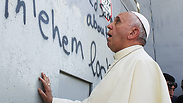
Pope Francis prays at separation fence, which has created a 'fictitious municipal area'
צילום: AFP
Jerusalem, the city joined apart
Op-ed: After pope's visit ends, Jerusalem Day celebrations will begin, but gaps between west and east will remain huge.
Not far from the Beit Orot Yeshiva, on the Mount of Olives range, is the Vatican representative's empty residence. In one of the rooms, the pope sleeps only when he arrives on a visit. Jerusalem is filled with ghost houses belonging to rich Jews from overseas. One more home does not affect the real estate problem.
Francis, the new pope, arrived in Israel on Sunday. Personally, I am not particularly impressed by men who wear dresses and speak on behalf of God. We have enough of our own. On the other hand, there are guests who help us remember all kinds of forgotten corners in our home.
There were years in history in which Christian leaders brought destruction and ruin here. Today they bring money and publicity. When a pope arrives, the State of Israel renovates. When he leaves, it usually forgets what it renovated.
Five years ago, before Pope Benedict XVI's visit, the road from the Old City of Jerusalem to the Mount of Olives was expanded. Someone was concerned that the pontiff would notice that the route is narrow and neglected.
Most leaders who visit Jerusalem see the Old City through the window of their hotel suite, and hear about the eastern part of the city from Israeli and Palestinian representatives. The head of the Catholic Church has no choice, He is bound by tradition.
When Jesus walked about the area, he did not know about the future politics. He descended from the Mount of Olives, and crossed from the east to the west without any lines and European declarations.
Jerusalem is a beautiful city. It's easy to fall in love with it, to sing songs in its honor. It's easy to be afraid of it when one gets hit by stones just like that.
On days with no papal security, young Palestinians occasionally throw stones at people visiting the Mount of Olives. Sometimes, at night, they desecrate graves at the cemetery. Former Prime Minister Menachem Begin, writer Shmuel Yosef Agnon, Rabbi Abraham Isaac Kook and Eliezer Ben-Yehuda, the reviver of the Hebrew language, rest there in peace, but around them everyone is awake.
According to a recently published report, last month alone there were more than 150 nationalistically-motivated incidents in east Jerusalem. The report does not include the violent incidents and Molotov cocktails hurled at a synagogue on the French Hill neighborhood. Hate crimes develop among Muslims and Jews in areas where there is no significant enforcement.
No decisions or policies
In my first year as a student at the Hebrew University on Mount Scopus, I returned to the parking lot to discover that someone had smashed the windowpane and stolen the radio. My car was old and faltering, the radio was new. Around me I saw owners of other vehicles cursing and kicking the wheels.For an entire week, together with a group of friends, we set ambushes in the buses in a bid to catch the thieves. We were unsuccessful. In Jerusalem, it seems, thieves do not return to the crime scene twice.
It was the most dramatic security-related incident that year at the Faculty of Humanities. The spirit has changed since then. Today, soldiers who leave the base near the university open the route almost like what used to be done in Lebanon once. Female students complain of a feeling of insecurity.
After the pope's visit ends, Jerusalem Day celebrations will begin. Politicians will speak about the city joined together, the flags will be waved and the situation will remain unchanged. The gap between what the Israelis think and the reality on the ground is huge. More than Jerusalem is united, it is comprised of areas and statements.
In the western part of the city there is a modern state, a capital with a Supreme Court, evident law and governance. In the eastern part of the city there is one big entanglement. The separation fence has created a fictitious municipal area. Israel pays national insurance, but does not go in there. The mayor does not visit neighborhoods like Qalandiya, and neither does the army usually. The area is controlled by Palestinian Authority officials.
The fence separates. Under the law, it must not be crossed. That's what the sign at the roadblock says. It's a Jerusalem neighborhood only in theory. The same applies to other villages in the area.
Most Israelis are unfamiliar with this layer. There are no decisions or policies there, and it's difficult to find politicians who will volunteer to discuss their vision or decisions about the future.
Between the western part of the city and the fence, we have historical Jerusalem. The Jewish neighborhoods are flourishing; in the rest of the area, governance is wilting. There is partial taxation, there are partial services, and Israel is acting as if it is there partially. The Mount of Olives is just an example. If we want sovereignty, we can’t rely on the pope's visits.










